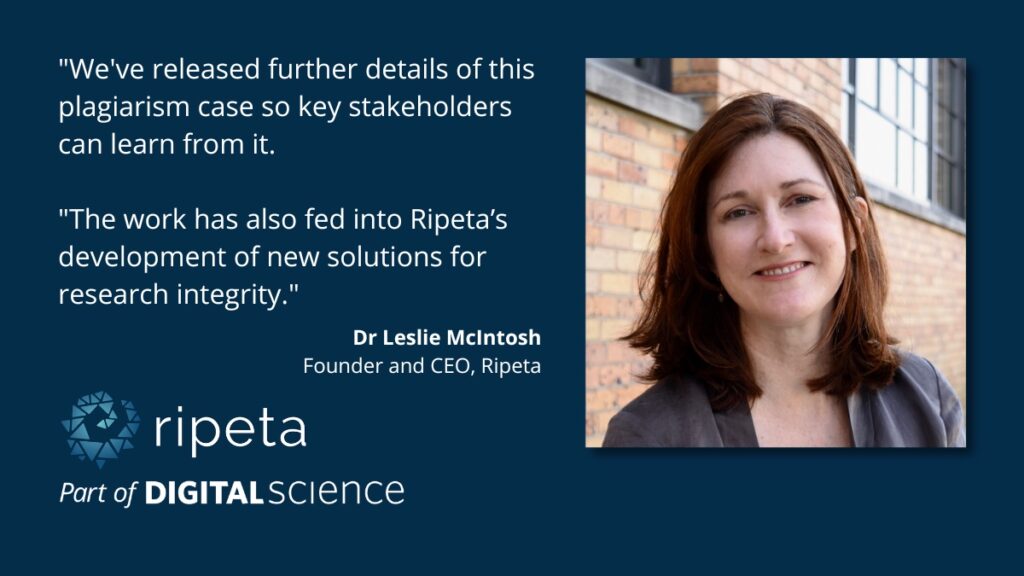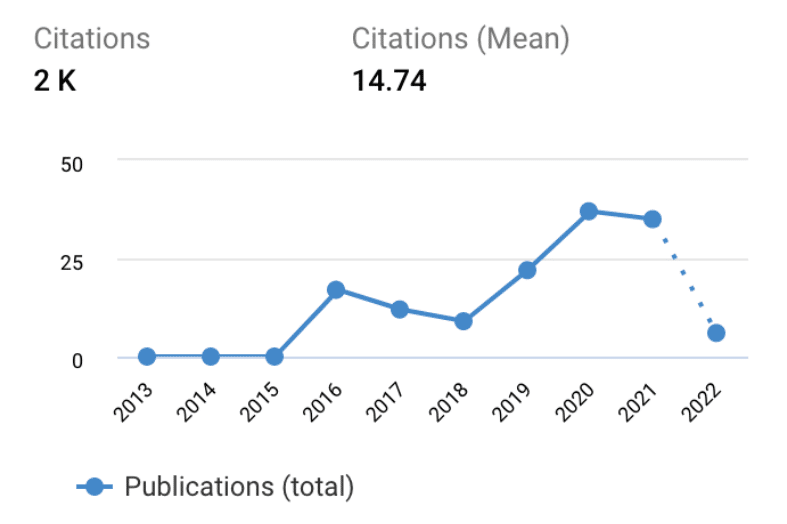
To fall down a rabbit hole, in today’s usage, implies that while done voluntarily, the consequences are nightmarish, with all sorts of hazards and unintended consequences. While this differs to the original meaning from Lewis Carroll’s Alice’s Adventures in Wonderland, as this New Yorker article spells out, there are corollaries that have only been discovered in today’s online-dependent world.
So, when Ripeta co-founder and CEO Leslie McIntosh described the start of her investigation of suspicious publication activity in March 2022 as being “interested in going down this rabbit hole”, she knew that while it would satisfy her curiosity as someone who had built a company on the basis of trying to improve science, it could also lead to some painful realisations as to how research and publications can go awry.
Back Story
The rabbit hole first appeared – as they so often do – in the shape of a tweet where an author had bemoaned the fact that a journal was ignoring the entreaties to act on a paper that had evidently plagiarised their own work. Over a year later, nothing had been done and so the author had taken to social media to air their concerns. After looking into the alleged plagiarism, Dr McIntosh found that the author in question – Mohammed Sabah Uddin – had published well over 100 papers while at Southeast University in Bangladesh before moving on more recently to Hong Kong University. Dr McIntosh’s suspicions were further raised by an acknowledgement in the suspect article from ‘Pharmakon Neuroscience’, which could not be verified in the GRID database maintained by parent company Digital Science.
After completing a series of integrity checks using Ripeta’s technology, including cross-referencing co-authors and funding agencies, Dr McIntosh found a number of other similar acknowledgments of Pharmakon by using the Dimensions database, which contains full text searching suitable to support this type of forensic work.
Dr McIntosh explains: “The work myself and colleagues carry out is a way of protecting the academic record, and in so doing supports the increasing number of institutions, publishers, funders, and researchers who place research integrity at the heart of their approach to research.”
“As part of Ripeta’s work providing tools to highlight potential challenges to research and publication integrity principles, we will build a case study so key stakeholders can learn from this example. The work has also fed into Ripeta’s development of new solutions for research integrity.”
Analyses revealed other anomalies in Uddin’s publication record, such as:
- A large number of articles published (130+) in a short time (from 2016-2021; source: Dimensions)
- A high number of citations to those papers (2,000+)
- A high number of verified reviews on Publons (300+).
Further details on Uddin’s publication record can be seen in the Appendix below.
These and other ‘trust markers’ led Dr McIntosh to consult Digital Science colleague Simon Linacre, who in addition to having 20 years’ experience in academic publishing, is also a Trustee of COPE with expertise in deceptive publishing practices. Confirming the findings of the investigation, it was time to approach the author himself.
“The work myself and colleagues carry out is a way of protecting the academic record, and in so doing supports the increasing number of institutions, publishers, funders, and researchers who place research integrity at the heart of their approach to research.”
Dr Leslie McIntosh, Founder and CEO, Ripeta
No Reply
In May 2022, Linacre used several verified email addresses to contact Uddin with a number of questions about the high volume of his articles and their similarities to other papers. Uddin was contacted three times to no avail, which is common when dealing with suspicious actors in the publishing environment. It was then decided to contact his current employer, which not only sparked an immediate response from HKU but also from Uddin himself, all on the same day. Apologising for not replying because earlier emails had gone into his email junk folder, scant details were supplied to the initial queries that had been raised. Further queries were sent to Uddin, this time copying in HKU, before the university announced a formal investigation.
The university acted quickly. After little more than a month following its investigation, HKU found evidence of improprieties on behalf of Uddin. It said he had admitted to copying 60 published papers out of a total of 180 published in the last few years – industrial-scale plagiarism made possible by using paraphrasing software to escape detection by anti-plagiarism tools. At this stage, it is still unclear how the other papers were written and published so quickly and which exact papers he authored legitimately. Overall, 90% of all articles published by Uddin are indexed in PubMed across more than 100 different journals and 10 different publishers.
Soon after concerns were raised with HKU, Uddin’s publication history in his ORCiD profile significantly changed from populated to empty. All citations and references were deleted. In late June, HKU signalled their investigations had concluded. HKU informed Digital Science Uddin would withdraw from his PhD program at the university, effective on 1st August.
Speaking on behalf of HKU, Professor Danny Chan, Director (Education and Development of Research Integrity) said: “Upholding research integrity has always been, and will continue to be, our top priority. Any breach of trust is not only detrimental to our career, but also to the funders and the academic world. We strive to ensure our students and colleagues are putting this commitment in daily practice.“
Looking Ahead
Since the story was published in Retraction Watch on 25 August, a number of enquiries have been made about other aspects of the case. Who was the author in question? Why did they plagiarise so many articles? Could more have been done to identify what was going on earlier?
As Dr McIntosh commented on the Retraction Watch article when someone asked about Uddin’s acceptance into a PhD program at HKU: “This means the university must have access to both a database with all the publications and a means to disambiguate the author’s name. If anything, it shows the cracks in our current ecosystem and that HKU is willing to improve.”
To ponder too much on the motivations of an individual author can risk overlooking the systemic issues in play that can drive researchers into going to extreme lengths to develop a stacked CV. The proverbial ‘publish or perish’ culture still persists in many research environments, and it is unlikely Uddin is the first to use new tools such as paraphrasing software to pad out their publishing record. The good news is that in addition to Ripeta’s existing solutions, it is developing new tools and integrations that have been aided by the Uddin investigation which should help institutions and publishers head off such problems in the future. The bad news is, however, that as part of the investigations into Uddin, they necessitated several other ‘rabbit holes’ in the shape of co-authors and other articles acknowledging Pharmakon support. There is still a long way to go before Alice hits the bottom of this particular rabbit hole, and it is unlikely to end up anywhere like Wonderland.
Appendix
Md. Sahab Uddin Publications per Dimensions (by citations)

Md. Sahab Uddin’s Publications Citations per Dimensions*
Publication Year
2017
2016
2018
2019
2020
2021
2022
GRAND TOTAL
Unique DOIs
17
12
9
21
35
34
6
134
Sum of Times Cited
181
101
176
837
571
132
1
1999
* This is the number of publications Ripeta identified with just the author’s name and the number of citations to papers during that year.

About the Author
Simon Linacre, Head of Content, Brand & Press | Digital Science
Simon has worked in scholarly publishing for almost 20 years. His background is in journalism, and he has been published in academic journals on the topics of bibliometrics, publication ethics and research impact.
The post Inside Story: How a postgrad plagiarised at least 60 papers in huge publishing scam appeared first on Digital Science.
from Digital Science https://ift.tt/iKyJzhu

No comments:
Post a Comment